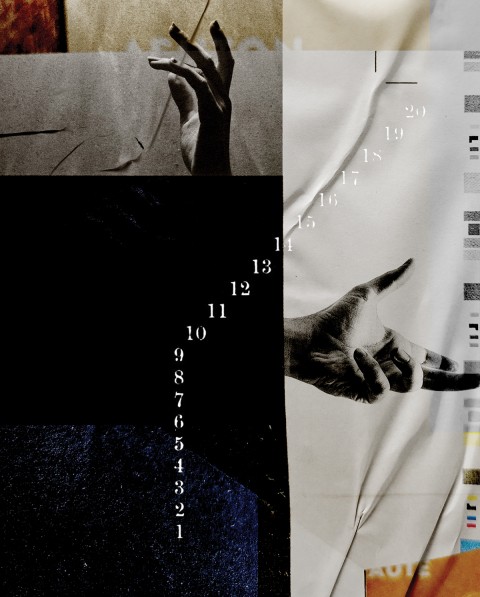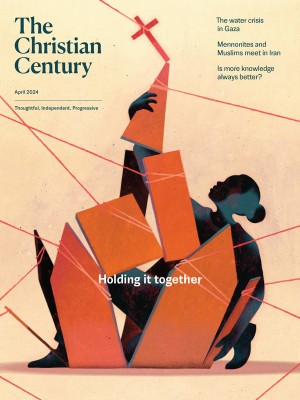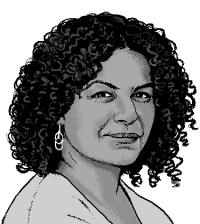A deeper legacy than hard work
The psalms of ascent press hard against the norms of our bootstrap culture.

Century illustration (Source images: Unsplash)
I heard a story recently that broke my heart. A pastor was speaking about his practice of meeting with families when their loved ones die. He makes a point, he said, of asking them about legacy. “What will you remember most vividly about your loved one? What have they left behind that you might carry forward?”
At least 80 percent of the time, he said, the families tell him that their loved ones worked hard. They worked extremely hard their entire lives—and that’s all the families can say, no matter how much the pastor probes.
He concluded: “We 21st-century Americans have created a culture of work so burdensome, people’s entire lives—their entire lifetimes—are dominated by its demands. There is no space left to breathe. To rest. To love and be loved. To flourish as human beings.”
Read our latest issue or browse back issues.
Indeed, many of us live by Boxer’s famous line in Animal Farm: “I will work harder.” We wake up too early, go to bed too late, slog too hard, and worry even harder. Some of us do these things because our workplaces—and the powerful cultural, economic, and political forces that control them—insist on it. Some of us believe doing these things will make us safer, smarter, or more successful. Some of us, heirs as we are of the infamous Protestant work ethic, believe that God desires our tireless toil. We mistake our culture’s toxic workaholism for Christian virtue.
What a startling departure this is from what our scriptures offer us. The gift of sabbath in Genesis. The gift of jubilee in Leviticus. The gift of easy yokes and light burdens in the Gospel of Matthew.
And perhaps most powerfully, the gift of perspective in Psalm 127: “Unless the Lord builds the house, those who build it labor in vain. Unless the Lord guards the city, the guard keeps watch in vain. It is in vain that you rise up early and go late to rest, eating the bread of anxious toil, for he gives sleep to his beloved.”
Since hearing the pastor’s story, I’ve returned to this psalm several times because it offers wisdom we’re not likely to hear in boardrooms or cubicles. The psalmist isn’t simply offering consolation; he’s pressing hard against the norms of our bootstraps culture.
Passages like Psalm 127 invite us to sit with a foundational truth we ignore at our peril: the work is God’s. The work is always God’s. This is true regardless of our vocations. God is the builder, the watchman, the healer, the artist, the teacher, the nurturer, the explorer, the cleaner. God is just as invested, involved, and sovereign in our work lives as God is at the altar or in the pews.
This means that our “anxious toil” isn’t virtuous; it’s harmful. God isn’t invested in helping those who help themselves; God is invested in helping the helpless. God is invested in aiding those who cannot build, guard, rise, rest, prosper, produce, multiply, or thrive without divine assistance.
And yet, even as I affirm this as true, I struggle to live it out in a world that clearly prefers people who rise early and retire late. After all, most of us have bills to pay, families to feed, bosses to please, and retirements to secure. What option do we have but to work extremely hard?
I wonder if we might reimagine our relationship to work through worship that is formational and transformative. Psalm 127 is one of the psalms of ascent, which were sung by the Israelites as they journeyed to Jerusalem for their annual festivals. As the Jewish pilgrims made their way into the holy city, they immersed themselves in the story of their covenantal relationship with God. They allowed their liturgies to remake them.
They sang of God’s salvation (Ps. 120:1), protection (121:5; 125:2), and provision (126:1). Through their acts of worship, these ancient pilgrims reminded themselves of who they really were: the children of God, sustained by God’s love, God’s story, God’s work. Whatever disordered stories or identities they might have latched onto in the grind of daily life, they could shed them on the road to Jerusalem. Through their worship, they reoriented themselves. They remembered that their vocations belong to God. They reassumed their proper place in the sacred story, recalling that God is the one who builds and watches.
In contrast, I routinely “eat the bread of anxious toil” because I neglect to immerse myself in the fullness of God’s story. I compartmentalize, separating my work from my worship, my weekdays from my Sundays, my inboxes from my sanctuaries.
What would it be like instead to build and watch under the sovereignty of God? To acknowledge God as the master builder and see our work as an extension of our worship? When the day is done but our work is not, what would it be like to surrender to the one who longs to give us rest?
“It is in vain that you rise up early and go late to rest, eating the bread of anxious toil, for he gives sleep to his beloved.” In addition to being pure poetry, this is a truth that runs counter to just about everything our culture tells us about our work. What a radical idea, that our worth as human beings doesn’t rest in our frenzied productivity but in God’s deep longing to gift us with sleep.
I wonder what my family will say about me someday, after I’m gone. What legacy of mine will they remember? What am I building with my life, and why am I building it? These are questions to ponder for a lifetime. I just hope that I’ll rest often enough to ponder them.






